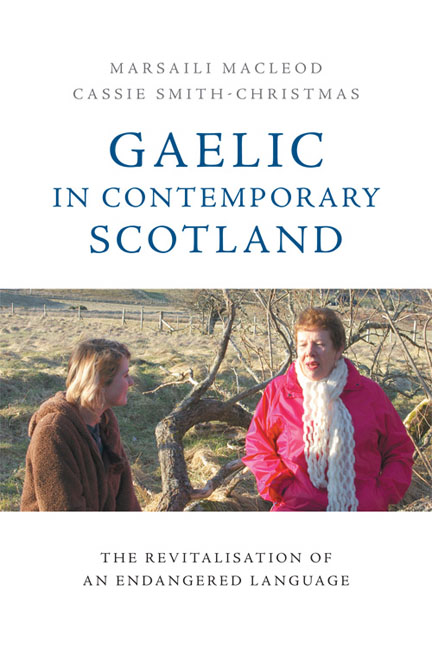Book contents
- Frontmatter
- Contents
- List of Figures
- List of Tables
- Notes on Contributors
- Foreword: Assailed yet Resolute
- Acknowledgements
- List of Abbreviations
- 1 Introduction
- 2 The Language of the Playground: Activists Building Consensus on the Language Policy and Ethos of a New Gaelic Immersion School
- 3 Mismatches between National and Local Gaelic Development: Cròileagan Dùn Èideann and the Promotion of Gaelic-medium Education
- 4 Gaelic amongst Schoolchildren: Ideas on Language Change and Linguistic Choices in Gaelic
- 5 When School is Over and Done With: Linguistic Practices and Sociodemographic Profiles of Gaelic-medium Educated Adults
- 6 New Speakers of Gaelic: A Historical and Policy Perspective
- 7 Learning Gaelic in Adulthood: Second Language Learning in Minority Language Contexts
- 8 Dlùth is Inneach: Charting Language Ideology in the Contemporary Gaelic World
- 9 Gaelic Language Use in Public Domains
- 10 Planning for Growth: The Professionalisation of the Taskforce for Gaelic Revitalisation
- 11 Organisational Language Planning: Gaelic Language Plans in the Public Sector
- 12 The Future of Gaelic Language Revitalisation in Scotland
- Index
8 - Dlùth is Inneach: Charting Language Ideology in the Contemporary Gaelic World
Published online by Cambridge University Press: 18 December 2019
- Frontmatter
- Contents
- List of Figures
- List of Tables
- Notes on Contributors
- Foreword: Assailed yet Resolute
- Acknowledgements
- List of Abbreviations
- 1 Introduction
- 2 The Language of the Playground: Activists Building Consensus on the Language Policy and Ethos of a New Gaelic Immersion School
- 3 Mismatches between National and Local Gaelic Development: Cròileagan Dùn Èideann and the Promotion of Gaelic-medium Education
- 4 Gaelic amongst Schoolchildren: Ideas on Language Change and Linguistic Choices in Gaelic
- 5 When School is Over and Done With: Linguistic Practices and Sociodemographic Profiles of Gaelic-medium Educated Adults
- 6 New Speakers of Gaelic: A Historical and Policy Perspective
- 7 Learning Gaelic in Adulthood: Second Language Learning in Minority Language Contexts
- 8 Dlùth is Inneach: Charting Language Ideology in the Contemporary Gaelic World
- 9 Gaelic Language Use in Public Domains
- 10 Planning for Growth: The Professionalisation of the Taskforce for Gaelic Revitalisation
- 11 Organisational Language Planning: Gaelic Language Plans in the Public Sector
- 12 The Future of Gaelic Language Revitalisation in Scotland
- Index
Summary
McLeod (2004a) argued persuasively that the post-1970s renaissance in Gaelic lan-guage development had been neglecting issues related to corpus planning, with the result that codification and elaboration of the language had seriously fallen behind the status planning ambitions of the Gaelic community. He concluded that corpus planning should become a ‘key priority’ for the new statutory language body, Bòrd na Gàidhlig, created as a result of the Gaelic Language (Scotland) Act 2005, and that ‘a dedicated unit focused on corpus planning, including both the ongoing creation of new terms and specific projects such as dictionaries, thesauruses and style guidebooks, should be created without delay and made a top priority’. When the Bòrd published its first five-year National Plan for Gaelic in 2007, it included a commitment that ‘Bòrd na Gàidhlig, consulting with key partners, will investigate the most suitable structure for a Gaelic language academy in order to ensure the relevance and consistency of Gaelic, including place-names’ (BnaG 2007: 35). The need for a Gaelic language academy to deliver codification and elaboration was given further impetus by Bauer et al. (2009) in a Bòrd-commissioned survey of the prospects for Gaelic language technology.
By March 2011, Bòrd na Gàidhlig was reporting that ‘progress on [the Gaelic lan-guage academy] has been slower than expected and it is now anticipated that the public consultation will take place as part of the National Gaelic Language Plan 2012/17 consultations’ (BnaG 2011: 39). In an attempt to break the apparent deadlock, in late 2011 a group of Soillse-affiliated academics from the Universities of Glasgow and Edinburgh drafted a discussion paper for the Bòrd's Gaelic Academy Working Group, recommending ‘a twelve-month investigative survey into corpus planning for Gaelic, aimed at establishing an appropriate linguistic foundation, and surveying and evaluat-ing the work that has already been done’ (McConville et al. 2011). This recommenda-tion was largely accepted in late 2012, and in January 2013 Soillse commenced work on the Dlùth is Inneach public consultation project, commissioned by Bòrd na Gàidhlig to answer the following questions:
• What corpus planning principles, or linguistic foundations, are appropriate for the strengthening and promotion of Scottish Gaelic?
• What effective coordination, or institutional framework, would result in their implementation?
- Type
- Chapter
- Information
- Gaelic in Contemporary ScotlandThe Revitalisation of an Endangered Language, pp. 114 - 127Publisher: Edinburgh University PressPrint publication year: 2018

